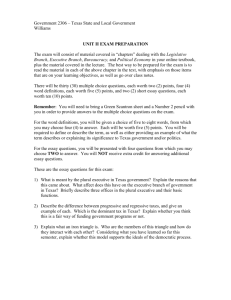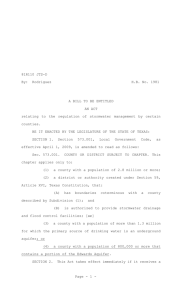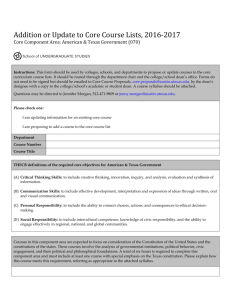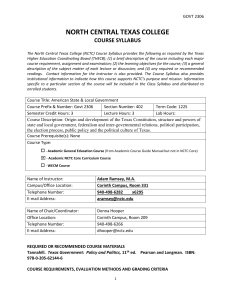Syllabus - North Central Texas College
advertisement
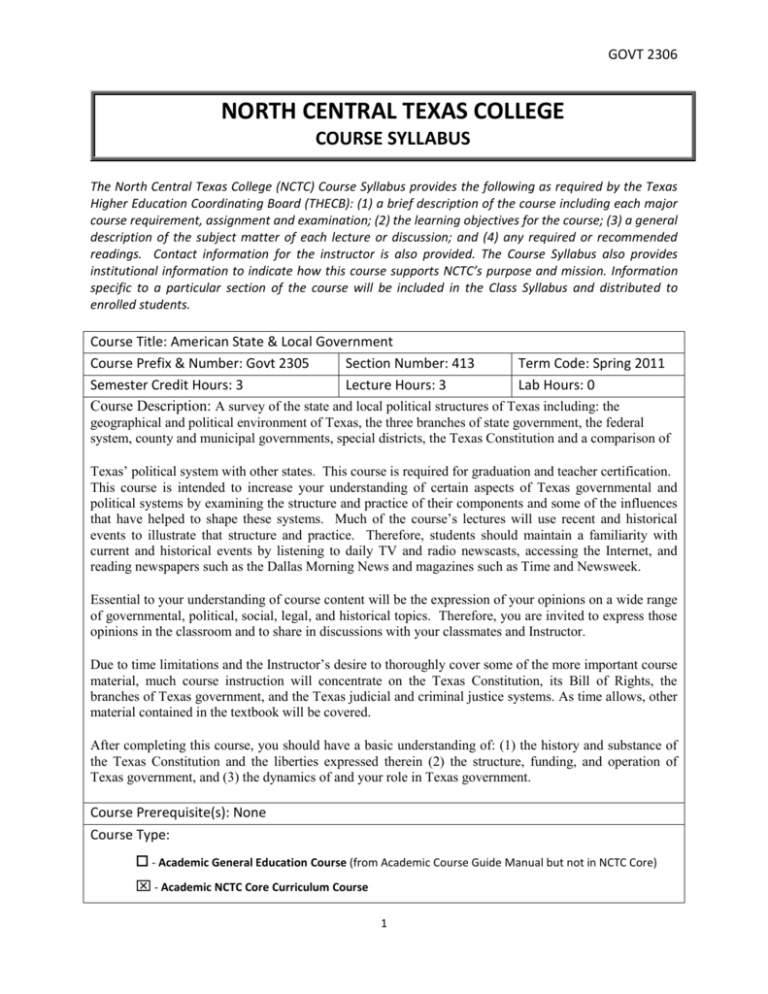
GOVT 2306 NORTH CENTRAL TEXAS COLLEGE COURSE SYLLABUS The North Central Texas College (NCTC) Course Syllabus provides the following as required by the Texas Higher Education Coordinating Board (THECB): (1) a brief description of the course including each major course requirement, assignment and examination; (2) the learning objectives for the course; (3) a general description of the subject matter of each lecture or discussion; and (4) any required or recommended readings. Contact information for the instructor is also provided. The Course Syllabus also provides institutional information to indicate how this course supports NCTC’s purpose and mission. Information specific to a particular section of the course will be included in the Class Syllabus and distributed to enrolled students. Course Title: American State & Local Government Course Prefix & Number: Govt 2305 Section Number: 413 Term Code: Spring 2011 Semester Credit Hours: 3 Lecture Hours: 3 Lab Hours: 0 Course Description: A survey of the state and local political structures of Texas including: the geographical and political environment of Texas, the three branches of state government, the federal system, county and municipal governments, special districts, the Texas Constitution and a comparison of Texas’ political system with other states. This course is required for graduation and teacher certification. This course is intended to increase your understanding of certain aspects of Texas governmental and political systems by examining the structure and practice of their components and some of the influences that have helped to shape these systems. Much of the course’s lectures will use recent and historical events to illustrate that structure and practice. Therefore, students should maintain a familiarity with current and historical events by listening to daily TV and radio newscasts, accessing the Internet, and reading newspapers such as the Dallas Morning News and magazines such as Time and Newsweek. Essential to your understanding of course content will be the expression of your opinions on a wide range of governmental, political, social, legal, and historical topics. Therefore, you are invited to express those opinions in the classroom and to share in discussions with your classmates and Instructor. Due to time limitations and the Instructor’s desire to thoroughly cover some of the more important course material, much course instruction will concentrate on the Texas Constitution, its Bill of Rights, the branches of Texas government, and the Texas judicial and criminal justice systems. As time allows, other material contained in the textbook will be covered. After completing this course, you should have a basic understanding of: (1) the history and substance of the Texas Constitution and the liberties expressed therein (2) the structure, funding, and operation of Texas government, and (3) the dynamics of and your role in Texas government. Course Prerequisite(s): None Course Type: - Academic General Education Course (from Academic Course Guide Manual but not in NCTC Core) - Academic NCTC Core Curriculum Course 1 GOVT 2306 - WECM Course Name of Instructor: Campus/Office Location: Telephone Number: E-mail Address: Charles Cooper Before or after class 940-498-6295 ccooper@nctc.edu Name of Chair/Coordinator: Office Location: Telephone Number: E-mail Address: Crystal R.M. Wright Gainesville Campus, Room 815 940-668-7731, ext. 4320 cwright@nctc.edu REQUIRED OR RECOMMENDED COURSE MATERIALS Tannahill. Texas Government: Policy and Politics, 11th ed. Pearson and Longman. ISBN: 978-0-205-62144-6 COURSE REQUIREMENTS, EVALUATION METHODS AND GRADING CRITERIA # of Graded Course Elements 4 10-15 1 Extra Credit Graded Course Elements Exams Class Assignments/Participation/Reading Quizzes Research Project None Percentage or Points Values 60% of final grade 20% 20% None INSTITUTIONAL LEARNING GOALS A quality general education curriculum in all associate degree programs. Quality freshman and sophomore level courses in arts and sciences which parallel the lower division offerings of four-year colleges and universities. Quality technical programs leading directly to careers in semi-skilled and skilled occupations, and quality technical education programs up to two years in length leading to certificates and associate degrees. Quality programs and services in support of adult literacy and basic skills development as a mean of workforce enhancement and expanding access to higher education. 2 GOVT 2306 PROGRAM PURPOSE STATEMENT NCTC seeks to implement its goal of offering quality general education curriculum in all associate degrees by offering a core of general education courses designed to help students achieve academic, career and lifelong goals. Acquiring knowledge, thinking critically, and utilizing the methodologies of various disciplines exposed students to experiences that serve to advance their personal growth. The chief focus of the General Education Core Curriculum at NCTC is to emphasize Exemplary Educational Objectives and Basic Intellectual Competencies. DEPARTMENTAL PURPOSE STATEMENT The NCTC Social Science Department provides students at NCTC a strong foundation in the liberal arts that is essential for career success, leadership, global citizenship, and a lifetime of learning. The department provides students with a broad knowledge and understanding of the world; significant intellectual, critical thinking and practical skills; and a strong sense of civic responsibility for enriching their lives and making a difference in society. STATEMENT OF SKILLS AND KNOWLEDGE EXPECTED OF NCTC GRADUATES NCTC seeks to implement its goal of offering a core of general education courses designed to help students achieve academic, career and lifelong goals. The chief focus of the General Education Core Courses at NCTC is to emphasize basic intellectual competencies and broad intellectual perspectives. CORE CURRICULUM COMPONENT AREA The overall objective of the Social & Behavioral Science component area is to increase students’ knowledge of how social and behavioral scientists discover, describe, and explain the behaviors and interactions among individuals, groups, institutions, events and ideas. Such knowledge will better equip students to understand themselves and the roles they play in addressing the issues facing humanity. SOCIAL & BEHAVIORAL SCIENCE: EXEMPLARY EDUCATIONAL OBJECTIVES (EEOs) (SBS1) To employ the appropriate methods, technologies and data that social and behavioral scientists use to investigate the human condition. (SBS2) To examine social institutions and processes across a range of historical periods, social structures, and cultures. (SBS3) To use and critique alternative explanatory systems or theories. (SBS4) To develop and communicate alternative explanations or solutions for 3 GOVT 2306 contemporary social issues. (SBS5) To analyze the effects of historical, social, political, economic, cultural, and global forces on the area under study. (SBS6) To comprehend the origins and evolution of U.S. and Texas political systems, with focus on the growth of political institutions, the constitution of the U.S. and Texas, federalism, civil liberties, and civil and human rights. (SBS7) To understand the evolution and current role of the U.S. in the world. (SBS8) To differentiate and analyze historical evidence (documentary and statistical) and differing points of view. (SBS9) To recognize and apply reasonable criteria for the acceptability of historical evidence and social research. (SBS10) To analyze, critically assess, and develop creative solutions to public policy problems. (SBS11) To recognize and assume one’s responsibility as a citizen in a democratic society by learning to think for oneself, by engaging in public discourse, and by obtaining information through the news media and other appropriate information sources about politics and public policy. (SBS12) To identify and understand differences and commonalities within diverse cultures. STUDENT LEARNING OUTCOMES EEO Student Learning Outcome 3,4,5,6,8 Differentiate between Democracy & elitism, and identify how the Constitution of Texas relates to these concepts. 2,5,9 Identify the regions of Texas and the major cities within each region Identify key political individuals in Texas Political History. 5,6 Compare and contrast the major characteristics of Texas Constitution with other 2,5,6,8 mega states and the U.S. Constitution. Explain the structure and powers of the county, the city and Special Districts in 4,5,10 Texas. 3,5,10,11 Identify and explain the processes of Texas Elections and differentiate among Texas’ Political Parties. 4,5,6,10 Identify the leaders and explain the power and structure of bureaucracy and board commission system of Texas. Identify the courts in the Texas Judicial System and their respective jurisdictions. 5,6 5,6,10,11 Differentiate between the powers and responsibilities of all three branches of government & identify leaders in each branch. 4 GOVT 2306 1,9,11 Research and compose an essay assignment/argument using proper grammar/English and basic computer skills. GENERAL DESCRIPTION OF SUBJECT MATTER FOR EACH LECTURE/DISCUSSION Topic General Description of Subject Matter State Constitution Historical/Political development from Republic to Present State and Federalism State Policymaking within Federal system Political Participation Voting rights, political participation and types of elections Political Parties & Interest Groups Development within the state and policymaking powers The Texas Legislature Structure, Membership, Legislative Process, & Policymaking Executive Branch The Governor, Executive Bureaucracy & Decentralized power Judicial Branch The Texas Court System, Structure and Jurisdiction; Judicial Election/Appointment process; Civil/Criminal laws and punishments Local Government Structure, Power, and Policymaking: City, County; School; and Special Districts State Budget Policy Types of state revenue; expenditures; budgetary process BASIC INTELLECTUAL COMPETENCIES FOR THIS COURSE READING – Reading at the college level means the ability to analyze and interpret a variety of printed materials – books, articles and documents. A core curriculum should offer student the opportunity to master both general methods of analyzing printed materials and specific methods for analyzing the subject matter of individual disciplines. WRITING – Competency in writing is the ability to produce clear, correct, and coherent prose adapted to purpose, occasion, and audience. Although correct grammar, spelling, and punctuation are each a sine qua non in any composition, they do not automatically ensure that the composition itself makes sense or that the writer has much of anything to say. Students need to be familiar with the writing process including how to discover a topic and how to develop and organize it, how to phrase it effectively for their audience. These abilities can be acquired only through practice and reflection. SPEAKING – Competence in speaking is the ability to communicate orally in clear, coherent, and persuasive language appropriate to purpose, occasion, and audience. Developing this competency includes acquiring poise and developing control of the language through experience in making presentations to small groups, to large groups, and through the media. 5 GOVT 2306 LISTENING – Listening at the college level means the ability to analyze and interpret various forms of spoken communication. CRITICAL THINKING – Critical thinking embraces methods for applying both qualitative and quantitative skills analytically and creatively to subject matter in order to evaluate arguments and to construct alternative strategies. Problem solving is one of the applications of critical thinking, used to address an identified task. COMPUTER LITERACY – Computer literacy at the college level means the ability to use computer-based technology in communicating, solving problems, and acquiring information. Core-educated students should have an understanding of the limits, problems, and possibilities associated with the use of technology, and should have the tools necessary to evaluate and learn new technologies as they become available. 6 GOVT 2306 Last day to Withdraw For the Spring 2011 semester, the last day to withdraw from a course with a “W” is April 22, 2010. Student Rights & Responsibilities Scholastic Integrity NCTC Board policy FLB (Local) Student Rights and Responsibilities states that each student shall be charged with notice and knowledge of the contents and provisions of the rules and regulations concerning student conduct. These rules and regulations are published in the Student Handbook published in conjunction with the College Catalog. All students shall obey the law, show respect for properly constituted authority, and observe correct standards of conduct. Scholastic dishonesty shall constitute a violation of college rules and regulations and is punishable as prescribed by Board policies. Scholastic dishonesty shall include, but not be limited to cheating on a test, plagiarism, and collusion. STUDENT SUPPORT SERVICES ACCESS (Disability Support) North Central Texas College is committed to both the spirit and letter of federal equal opportunity legislation, including the Americans with Disabilities Act (ADA) and section 504 of the Rehabilitation Act of 1973. NCTC is required by law to provide "reasonable accommodations" to students with disabilities, so as not to discriminate on the basis of that disability. It is the student’s responsibility to provide disability documentation to the ACCESS Office which authorizes accommodations for students with disabilities. The ACCESS Office is located in room 170 on the Corinth Campus and room 110 of the Administration (100) Building on the Gainesville Campus. Students can also call 940-668-7731 ext. 4321 or 940-498-6207. 7 GOVT 2306 Student Success Center The Student Success Center is designed to help all students at NCTC develop tools to achieve their academic goals. The center links students to FREE tutoring, including a Writing Center, a Math Lab, and free online tutoring in the evening. The program helps students acclimate to college by providing students free interactive workshops about Time Management, Study Skills, Test Anxiety, and much more. For more information, please visit your nearest Student Success Center. Financial Aid, Scholarships, and Veterans Services The Financial Aid Office is responsible for administering a variety of programs for students who need assistance in financing their education. The first step for financial aid is to complete a FAFSA. For more information, please visit your nearest Financial Aid Office. Classroom Instruction: You will be exposed to three primary sources of information: lecture, Angel, and the textbook. Students are expected to synthesize the information from these sources into a coherent whole. It is the student’s responsibility to learn course material, whatever the source. The time to try and understand this information is in the classroom while the material is discussed. It is the responsibility of the student to learn the course material. Other Pertinent Information Not all material covered in the textbook will be covered in class lectures; conversely, not all material covered in class lectures or Angel will be found in the textbook. Therefore, it is insufficient for a student to rely only on lecture notes or only on the textbook or Angel content. It is essential that students take comprehensive and detailed notes and thoroughly study and understand all information sources Attendance: You are required to … Attend all classes Arrive on time Stay in class until dismissed Complete in class assignments Pay attention Refrain from engaging in behavior that distracts the instructor or other students Because of the nature of this class (only meeting once a week) more than two (2) absences will result in the students being dropped from this course. The student will need to do the requisite paper work to officially drop the class. 8 GOVT 2306 Each and every instance of your failure to comply with any one of these requirements may result in a deduction of up to ten (10) points from the final grade in this class during the semester. Any failure to comply may result in your expulsion from the class. All absences due to illness or injury may only be excused if the student presents a valid written medical excuse from the student’s attending physician. Family emergencies shall be considered by the Instructor as possibly excusable if the subject of such emergencies is your mother, father, sister, brother, spouse, grandparent, or child. Personal events (e.g., family vacations or weddings) are not considered legitimate reasons for missing class. During class it is your responsibility to make sure that you sign in. During this semester the last day to withdraw from a class with a "W" is April 22, 2011. Be aware that after that date you will receive an academic grade in the course. Initiating the drop procedure is the student's responsibility. If you have any questions about withdrawals, please check with the Registrar’s Office. You may repeat this course only once after receiving a grade, including “W”. Note: while the Instructor maintains attendance records, such records are for the Instructor’s use. Classroom Behavior: The classroom is intended to be a learning environment. Disruptions of that environment or inattentiveness by students will not be tolerated. Disruptions or inattentiveness shall include, but are not limited to: Talking, laughing, or engaging in similar behaviors when the Instructor or another student is talking about course material; Sleeping, closing one’s eyes for extended periods that mimic sleeping, laying one’s head on the desk, or assuming a posture other than one of attentiveness; Doing other course work in class, and failure to take notes or follow along in the text; 9 GOVT 2306 Use of a cell phone or similar device may result in your being dropped from the class. While audio taping of lectures is permitted, please advise the Instructor before taping. No videotaping is allowed. Turn off all cell phones, pagers, and similar devices. Using a cell phone or other like devices in class is strictly prohibited. Students using these devices may be removed from class immediately and for the entirety of that class. Repeat offenders may also be dropped from the course at the instructor’s discretion. Any use of cell phone or like devices during an exam or reading quiz will result in a zero for that assignment. You must have the Instructor’s permission to use a PC during class. Grades: I will drop one (1) of your lowest exam grades as well as two (2) of your lowest reading quizzes/class assignments. However, the dropped grade cannot be a zero as a result of an absence on the assignment date. If you get a zero for a test because you were absent, that zero will stand. No makeup exams ill be offered in this course. All assignments must be attempted within the time frame they were intended, by the instructor, to be completed. Dropped grades will not be taken into account by the instructor until the end of the semester when grades are due. Students are more than welcome to calculate their own grades based on the outline offered in this syllabus. 10



